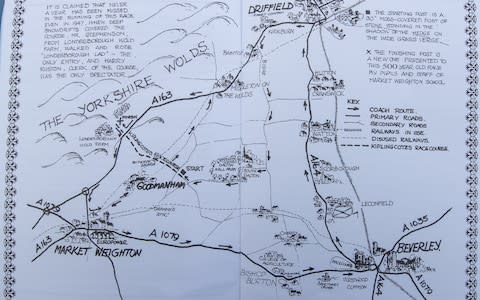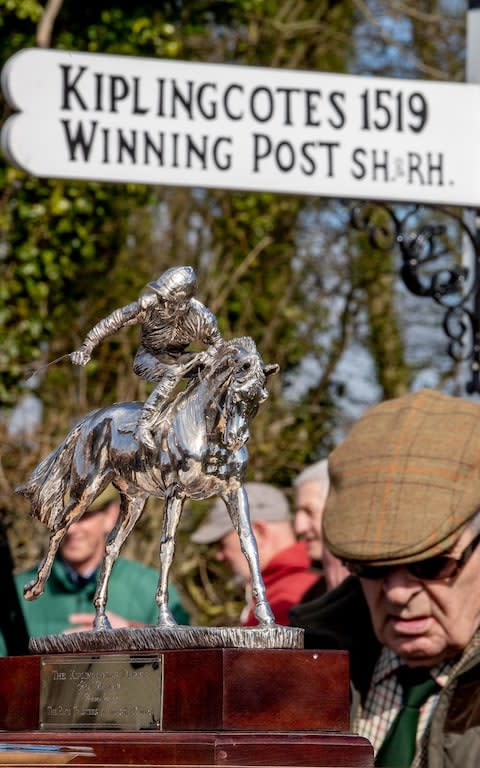England's oldest horse race celebrates 500th anniversary, after almost falling at the last hurdle

Twelve months ago it almost fell at the final hurdle, with a waterlogged course putting paid to the annual running of England’s oldest horse race.
Under the ancient rules of the Kiplingcotes Derby if the race does not take place one year then it can never be run again.
So last year a solitary volunteer had to walk a horse along the route to keep alive the ancient tradition, dating back to 1519.
Things were very different this time round, with dozens of riders taking part in the 500th anniversary of the four-mile cross country race in front of hundreds of spectators on Thursday.
Some had flown from across the Atlantic to watch the spectacle, including one Canadian family whose distant ancestors were reputed to have been in the crowd to watch the first ever race.

The Witty family, from Edmonton, Alberta, like to boast that Peter Witty and his brothers watched the first horse to romp home in the Kiplingcotes Derby five centuries ago.
On top of that a more recent ancestor, Richard Witty, born in 1802, won the race twice in the 1830s and 1850s.
Vanessa Witty said: "It's wonderful being here, and strangely nostalgic to walk around and know this is my ancestors' land."
In the end this year’s race was won by habitual winner Tracey Corrigan on her horse Frog, who beat a record field of 36 competitors to lift the trophy for the fourth time.
It was a bittersweet moment for Ms Corrigan, from Sawdon, near Scarborough. The horse she had intended to ride died after breaking his leg a few days ago, leaving her “very upset”.
She also bemoaned the fact that in her view the course through the farm lanes, tracks and public roads of the Yorkshire Wolds has been sanitised in recent years.
"There's no skill left to it now, no skill to riding it. Before you had to pick which puddle to go through, but now it's just perfect,” said Ms Corrigan.

The race, held on the third Thursday in March near Market Weighton, East Yorkshire, began life when King Henry VIII was in the third decade of his reign.
A set of race rules, discovered in a bank vault, prohibit riders ‘laying hold’ or striking each other and prevent owners of the horses, of their servants, hindering the riders on pain of disqualification.
Anyone can enter – as long as they weigh, or carry, at least 10 stone – but riders this year have been warned that they need to be “very experienced with a fit horse”.
More unusually the second placed rider can potentially earn more than the winner, as their prize is £4 of every £5 race entry fee compared to the £50 given for first place. This year that amounted to an estimated £144.
Chris Pitt, the racing historian, who has not missed the event in 27 years, said: "Things like this are a dying breed and need to be preserved, whether it's horse racing or any age-old tradition. I love the atmosphere, the people. It's totally different to a regular race meeting.”
But there are fears that the £12,000 cost of putting on the race may yet put an end to this long-standing tradition.
Guy Stephenson, 86, a retired farmer and race trustee whose family have organised the Kiplingcotes Derby for the past 100 years , said: “When I first started doing it, you turned up on the day, you didn’t have anything to do the day before, you found the £50 for the winner and that’s all you had to do.
“Hopefully they’ll keep it going, it would be a shame for it to end after all these years.”


 Yahoo News
Yahoo News 
